CIS Generative AI Fair
November 1, 2024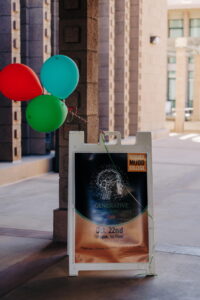
On Tuesday, October 22, 2024, CIS held our first ever generative AI Fair on the ground floor of the Sprague Building. In addition to four stations where attendees could learn more about different generative AI tools, there was food, drinks, prizes, and games. Turnout was excellent, with faculty, staff, and students attending.
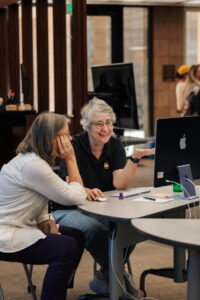
The four stations highlighted a variety of generative AI tools. Elizabeth Hodas described how to use Google Gemini Chat at one of the stations. She also demonstrated how the Gemini Education license, which is available for an additional monthly fee per user, integrates Gemini into Google Workspace tools, such as Google Docs, Sheets, Slides and Email. CIS has not yet turned on Google Gemini Chat for everyone in the HMC domain, but we hope to do so soon. We are waiting for Gemini Chat to be covered under the same licensing conditions as our Google Workspace license, which will include data privacy and FERPA protection. Unlike with consumer products like ChatGPT, which can use anything a user enters into the prompt for training purposes, once Gemini Chat is included in our Google Workspace license, your data will remain private and cannot be used for training purposes.
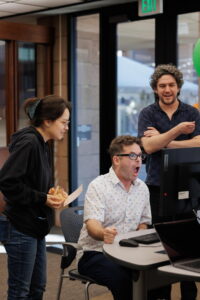
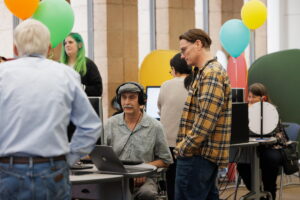
James Sadler and Gilbert Gutierrez hosted a station focused on creative applications of generative AI, using Midjourney for text-to-image generation and Suno for text-to-music generation. Both of these tools are just examples of the many creative generative AI tools available for use by anyone. Most services offer a free tier that limits the number of prompts a user can submit per day. If a user wants to access more submissions they can upgrade their account or buy extra “tokens.” None of these tools are supplied by CIS at this time, but we are always willing to help however we can.
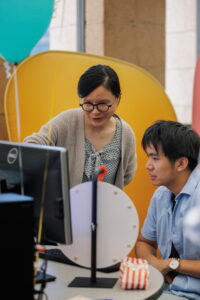
Yi Luo’s station focused on teaching faculty, staff, and students how to craft effective prompts for generative AI tools. Prompts are key to getting meaningful, creative, and relevant outputs from AI, and this station guided participants through the process of developing clear, concise, and imaginative prompts for text generation tools. Participants first spun a wheel that lands on different prompt categories. After they tried writing the first prompt, they then used a checklist of prompting techniques to “polish” the prompt. After polishing the prompt using the checklist, they submitted the refined version to the AI and compared it to the output from their original prompt.
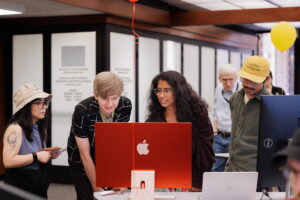
Aashita Kesarwani and Jonathan Ebueng hosted a station on Coding with AI that demoed Generative AI tools’ coding capabilities. Participants learned how to use the Gemini AI tool integrated with Google Colab to generate code based on instructions in plain English. They were then able to ask Gemini to explain the generated code, chat with the AI tool to check for sources of data and other information, and upgrade/improve the code using prompting techniques. Participants also got to check out a cool application that Jonathan built using Github Copilot, an AI coding assistant based on GPT models, that displayed how to create visual art with code using p5js, a creative programming library.
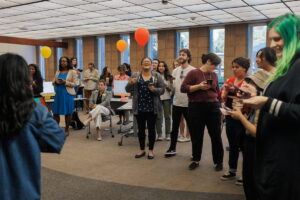
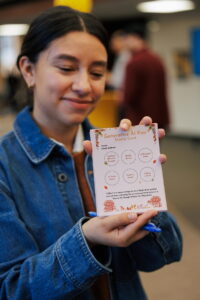
Another highlight of the event was a Kahoot online trivia game where participants could test their knowledge of generative AI. Attendees could join the game on their phones and answer increasingly difficult questions in order to get on the leader board. Elisabeth Villalta designed the game and Sara Palacios hosted it. The participants had a lot of fun with it. James Sadler also setup a station at the back of the room that demonstrated an AI-driven text adventure game from AI Dungeon. This platform allows users to play an old fashioned style text adventure game, or even create multi-player games role playing games where the AI acts as the game master. Game and character styles can vary widely, from medieval fantasy to gritty cyberpunk. The games are free, but are limited to 100 interactions per day.
All of the attendees received a stamp card when they arrived and could get it stamped when they visited one of the stations or played the games. Those who collected four or more stamps could turn in their stamp card and receive a free, colorful flash drive. Their stamp card was also entered into a raffle for a 1 TB portable hard drive, or one of six Gemini Education licenses that they can use for free for two months.
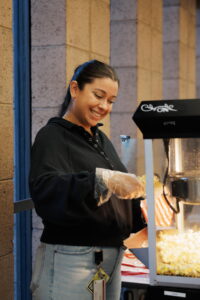
We are thrilled that the fair was such a success and look forward to sponsoring more events around this fascinating, and controversial, topic! In fact, there will be A Bite of Learning presentation on generative AI on November 13th, featuring a faculty panel. We hope to see you there!
Photos by Courtney Espiritu.